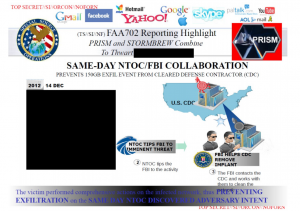Civil Libertarians to Dianne Feinstein: We Told You So
The moment when Dianne Feinstein should have called for a comprehensive review of NSA’s programs was no later than August 18, when she admitted the Senate Intelligence Committee doesn’t get briefed on violations that occur under Executive Order 12333, even though they constitute the bulk of violations.
The committee does not receive the same number of official reports on other NSA surveillance activities directed abroad that are conducted pursuant to legal authorities outside of FISA (specifically Executive Order 12333), but I intend to add to the committee’s focus on those activities.
The committee has been notified—and has held briefings and hearings—in cases where there have been significant FISA compliance issues. In all such cases, the incidents have been addressed by ending or adapting the activity.
[snip]
I believe, however, that the committee can and should do more to independently verify that NSA’s operations are appropriate, and its reports of compliance incidents are accurate. This should include more routine trips to NSA by committee staff and committee hearings at which all compliance issues can be fully discussed.
While at the time she bought the NSA’s roamer myth, it was already clear the NSA was spying on US persons via its bulk collection “overseas,” including via some of the more troubling violations. She should have further gotten concerned when both Keith Alexander and James Clapper dodged questions about upstream violations. But then, she was too busy reading factually inaccurate statements about the same collections.
Back in the day, though, making sure the NSA wasn’t using Article II to evade oversight used to be one of her chief concerns.
Nevertheless, it took the disclosures of spying on Angela Merkel — and, no doubt, the embarrassment of her party’s President, and perhaps growing support for a real investigation — to really rile her up.
It is abundantly clear that a total review of all intelligence programs is necessary so that members of the Senate Intelligence Committee are fully informed as to what is actually being carried out by the intelligence community.
Unlike NSA’s collection of phone records under a court order, it is clear to me that certain surveillance activities have been in effect for more than a decade and that the Senate Intelligence Committee was not satisfactorily informed. Therefore our oversight needs to be strengthened and increased.
With respect to NSA collection of intelligence on leaders of U.S. allies—including France, Spain, Mexico and Germany—let me state unequivocally: I am totally opposed.
Unless the United States is engaged in hostilities against a country or there is an emergency need for this type of surveillance, I do not believe the United States should be collecting phone calls or emails of friendly presidents and prime ministers. The president should be required to approve any collection of this sort.
It is my understanding that President Obama was not aware Chancellor Merkel’s communications were being collected since 2002. That is a big problem.
The White House has informed me that collection on our allies will not continue, which I support. But as far as I’m concerned, Congress needs to know exactly what our intelligence community is doing. To that end, the committee will initiate a major review into all intelligence collection programs. [my emphasis]
I welcome this review — by all accounts the torture review conducted under her supervision is more thorough than anything else we’ve seen.
But … ah, the torture review.
There’s one other reason DiFi should have been quicker to respond to questions Edward Snowden — whom she called a traitor — raised.
In December she finished a 6,000 page report, one key finding of which was that the CIA lied to her community.
Why did she think NSA would be any different?

